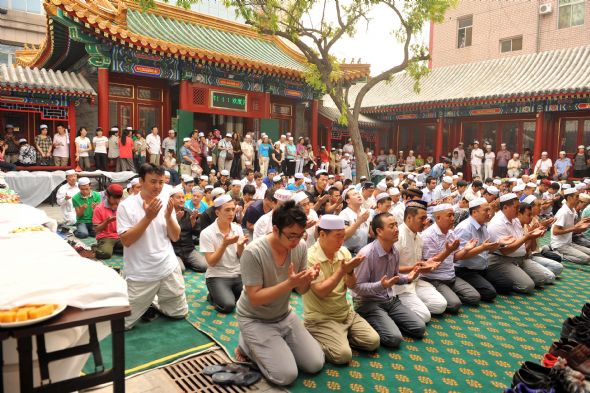
With prayers banned in public areas, private hajj trips not allowed, teaching of the Noble Qur'an not allowed in private and students and government officials forced to eat during Ramadan, China is enforcing laws and regulations restricting the practice of Islam.
"Of course this makes people angry," Mohammad, a teacher, told The New York Times on Sunday, October 19.
"Excitable people think the government is wrong in what it does. They say that government officials who are Muslims should also be allowed to pray."
In recent week, Chinese authorities have enforced laws restricting the ability of Muslims in the northwestern region of Xinjiang from practicing their faith.
In Khotan, signs posted in front of the grand mosque say the weekly Friday prayer sermon must not extend beyond than a half-hour.
Prayers in public areas outside the mosque is forbidden and residents are banned from worshipping at mosques outside their town.
Under the rules, imams are banned from teaching the Qur'an in private and only official versions of the Qur'an are allowed.
Studying Arabic is only allowed at special government schools.
Government workers are banned from showing the slightest sign of religious devotion.
For example, a Muslim civil servant could be sacked for donning hijab.
Many of the rules have been on the books for years, but local authorities have publicly highlighted them in recent weeks with banners hanged in towns.
They began posting regulations mandating women not to wear hijab and men to shave their beards.
Uighur Muslims are a Turkish-speaking minority of more than eight million in Xinjiang, a northwest vast area that borders Central Asia.
Atheist China recognizes five religions — Islam, Protestantism, Catholicism, Taoism and Buddhism — and tightly regulates their administration and practice.
Official Hajj
Under the rules, two of Islam's five pillars – the Ramadan fasting and hajj – are strictly controlled.
Students and government workers are compelled to eat during the holy fasting month of Ramadan.
China has also revived a law prohibiting Muslims from arranging their own trips to Saudi Arabia to perform hajj.
Signs painted on mud-brick walls in the winding alleyways of old Kashgar warn against making "illegal" hajj.
"Implement the policy of organized and planned pilgrimage; individual pilgrimage is forbidden," reads a red banner hanging on a large mosque in Urumqi, the regional capital of Xinjiang.
Authorities have also confiscated passports of Uighur Muslims across Xinjiang to force them to join government-run hajj tours rather than their own trips.
Once a person files an application, the authorities do a background check into the family.
If the applicant has children, the children must be old enough to be financially self-sufficient, and the applicant is required to show that he/she has substantial savings in the bank.
To get a passport to go on an official hajj or a business trip, applicants must leave a deposit of nearly $6,000.
Now virtually no Uighurs have passports, though they can apply for them for short trips.
This has made life especially difficult for businessmen who travel to neighboring countries.
Critics say the government is trying to restrict contacts with world Muslims, fearing that could highlight the sufferings of Muslims in Xinjiang and possibly build pressures on China.
[OnIslam.net]




No comments:
Post a Comment